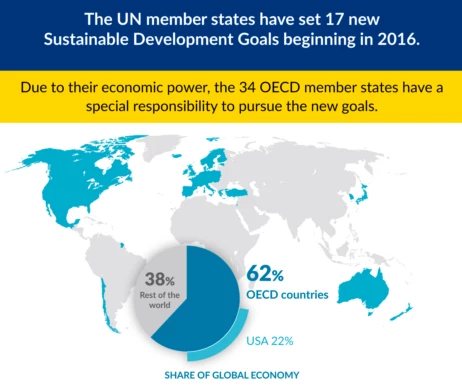
Sustainable development was once thought of as primarily a concern for the poorer, so-called “developing” countries. Today, with industrial civilization spreading across the entire world, devouring ever more resources and emitting more greenhouse gases into the atmosphere, economists believe wealthy countries too are in a sense still “developing” ones. Life on Earth will not survive in its current form if lifestyle of the northern countries remains as it is and extends across the planet.
That is the spirit behind the Bertelsmann Foundation’s latest report on wealthy country’s progress on fulfilling Sustainable Development Goals. Recent developments have often not been pretty. Many countries have stuck to energy-intensive economic models, and inequality has been rising almost everywhere, with economic elites getting an ever-larger part of the pie, while working and middle classes decline.
The Bertelsmann report shows that many developed countries do poorly along indicators such as health, social equity, biodiversity, climate emissions. The report notes: “Their inability to fight the growing social divide combined with their overuse of resources therefore shows that today’s high-income countries in their current shape can no longer serve as role models for the developing world.”
But, on the whole, one region does stand out as having the most well-rounded performance by far: Scandinavia. The top four countries in the index are Nordic: Sweden, Norway, Denmark, and Finland. Indeed, Europeans more generally can take heart in the fact that – even as much of the Old Continent is still ailing economically – the top ten countries are all in Europe.
The Nordic countries remain famously egalitarian, with broad-based prosperity and low poverty, even though cracks have emerged in some areas, such as the integration of immigrants (for example in Denmark). Certainly these countries are not perfect, sometimes producing unusually-high amounts of municipal waste or doing unusually poorly in PISA school tests. On the whole however their performance is incomparable.
Perhaps the most important indicator of environmentally sustainable development is carbon emissions. Here Nordic performance is above-average but still insufficient. Certainly, most Nordic countries have relatively low emissions compared to their GDP, but that is not enough. The one significant exception is Sweden, which has astonishingly low carbon emissions both absolutely and relative to its GDP, emitting less per capita than any other OECD country except Mexico and Turkey, which are both significantly less developed. As the Bertelsmann report notes:
"Sweden [. . .] managed to cut its already outstandingly low levels of greenhouse gas emissions relative to GDP by more than another third (35 percent) since 2006. Such enormous progress at an already high level puts other countries to shame and is worthy of emulation. [. . .] Concrete policy instruments which have fostered this success in Sweden include the carbon tax on the use of coal, oil, natural gas, petrol, and aviation fuel. It set the right financial incentives for the use of biomass, such as waste from forests and forest industries, in heating systems instead of using carbon."
The Nordic model then continues to be the best one for broadly shared prosperity and Sweden shows an assertive national policy can improve upon already existing high performance on the environment, one of the most critical issues facing us this century. Foreign models cannot in most cased be uncritically imported into a given nation but the Nordic countries provide us with a powerful example of how we can achieve sustainable development this century.
Craig Willy is an EU affairs writer. His blog is available here. He writes for the Bertelsmann Stiftung’s SGI News and BTI Blog.
Tweet this: Scandinavia has the most well-rounded sustainability performance according to the recent report by Bertelsmann Foundation
Tweet this: Carbon emissions is the most important indicator of environmentally sustainable development.
Tweet this: Sweden has astonishingly low carbon emissions relative to its GDP, emitting less per capita than any other OECD country.


Join the Conversation